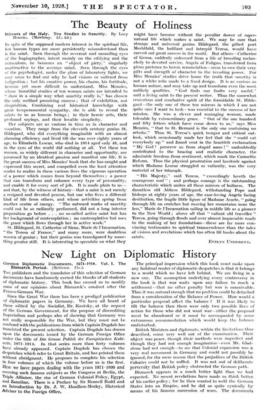The Beauty of Holiness
Mirrors of the Holy. Ten Studies in Sanctity. By Lucy Menzies. (Mowbray. 123. ed.) IN spite of the supposed modern interest in the spiritual life, few human types are more persistently misunderstood than
is the saint. Seen through the reverent and unsmiling eyes of the hagiographer, intent mainly on the edifying and the miraculous, he becomes an "object of piety," singularly unattractive to the average mind. Seen through the eyes of the psychologist, under the glare of laboratory lights, we may seem to find out why he had visions or suffered from indigestion; but his creatiVe power, his charm, his Certitude, become yet more difficult to understand. Miss Menzies, whose beautiful studies of ten women saints are intended to• show in a simple way what sanctity really is," has chosen the only method promising success ;- that of exhibition, not disquisition. Combining real historical knowledge with great temperamental sympathy, she is able to reveal the saints to us as human beings ; in their heroic acts, their profound sayings, and their lovable simplicity-.
her subjects are as various in time as in character and vocation. They range from the eleventh century genius St. Hildegard, who did everything imaginable with an almost alarming efficiency and lived till she was over eighty years of age, to Elizabeth Leseur, who died in 1914 aged only 48, and in the eyes of the world did nothing at all. Yet these ten women, so widely different in character and opportunity, are possessed by an identical passion and manifest one life. It is the great success of Miss Menzies' book that she has caught and expressed this secret, and compelled even the least attentive reader to realize in these various -lives the vigorous operation of a power which comes from beyond themselves ; a power that- can transform and enhance every type of personality,- and enable it for every sort of job. It is made plain to us— and that, by the witness of history—that a saint is not merely a resigned and devoted person, but one who lives a different kind, of life from others, and whose activities spring from another centre of energy. "The outward works of sanctity could not be so radiantly performed, did not a long interior preparation go before . . . no so-called active saint but has her background of contemplation ; no contemplative but uses the grace which flews through her in active work."
St. Hildegard', St. Catherine of Siena, Marie de l'Incarnation, "the Teresa of France," and many more, were doubtless women of genius ; but their genius was transfigured by some- thing greater still. It is interesting to speculate on what they might have become without the peculiar dower of super- natural life which makes a saint. We may be sure that strange and universal genius Hildegard, the gifted poet Meehthild, the brilliant and intrepid Teresa, would have carved out great careers in the world. But others—Catherine of Genoa, suddenly redeemed from a life of brooding melan- choly to devoted service, Angela of Foligno, transferred from pious pretence to heroic renunciation—seem to owe their very gifts and strength of character to the invading power. For Miss Menzies' studies drive home the truth that sanctity is not a white robe made to a fixed design. It is as various as human nature, and may take up and transform even the most unlikely qualities. "God finds our faults very useful,” said a living saint to the present writer. Thus the somewhat censorious and combative spirit of the formidable St. Hilde- gard—the only one of these ten mirrors in which I am not quite sure I want to look—was essential to the success of her mission. She was a clever and managing woman, made tolerable by extraordinary grace. "Out of the one hundred and fifty letters which have come down to us," says Miss Menzies, "that to St. Bernard is the only one containing no rebuke." Thus St. Teresa's quick temper and critical out- look, which occasionally made her feel that she "could eat everybody up" and found vent in the heartfelt exclamation "My God ! preserve us from stupid nuns ! " undoubtedly contributed to the bracing and realistic character, the admirable freedom from sentiment, which mark the Carmelite Reform. Thus the physical prostration and lassitude against which Madame Leseur struggled so valiantly, was the very, material of her triumph.
"His Majesty," said Teresa, "exceedingly loveth the courageous soul " ; and perhaps courage is the outstanding characteristic which unites all these mirrors of holiness. The dauntless old Abbess Hildegard, withstanding Pope and bishops at eighty years of age, the ease-loving Angela facing destitution, the fragile little figure of Madame Acarie, "going through life on crutches but moving her mountains none the less," Marie de 'Incarnation sailing in middle life as a pioneer to the New World ; above all that "valiant old traveller" Teresa, going through floods and over almost impassable roads to the making of her foundations—these are far more con- vincing testimonies to spiritual transcendence than the tales of visions and revelations which too often fill books about the saints.
EVELYN UNDERHILL.












































 Previous page
Previous page